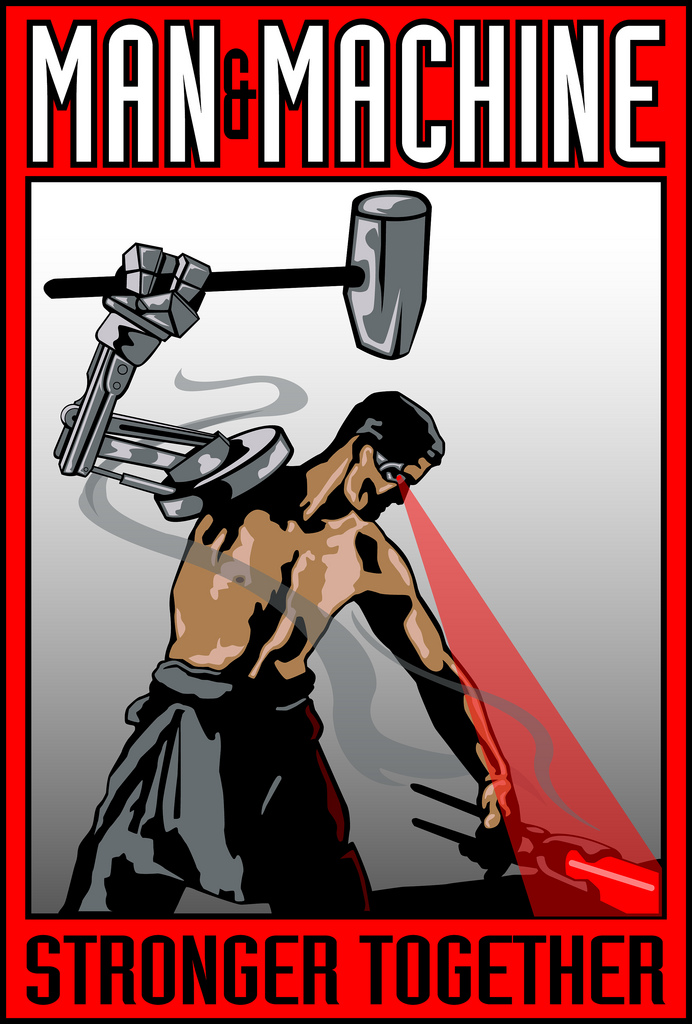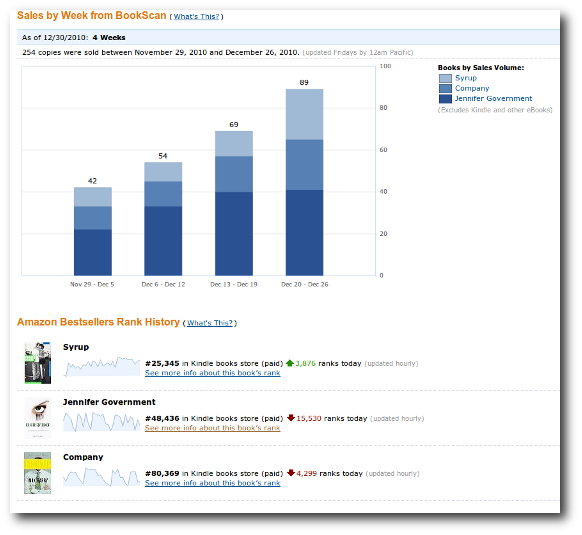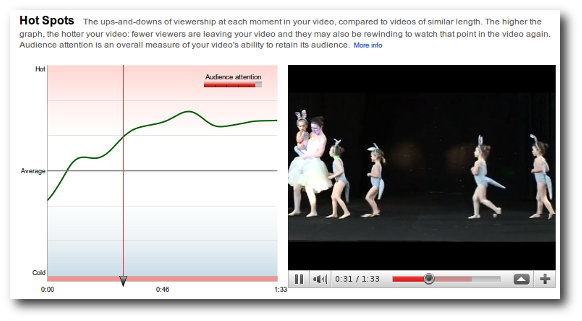Video: Machine Man Book Reading
![]() A
long video of a Machine Man book reading
at
Embiggen Books in Melbourne, Australia (October 2011).
A
long video of a Machine Man book reading
at
Embiggen Books in Melbourne, Australia (October 2011).
Stating the Obvious: Actors
![]() Lately I’ve been feeling sympathy for actors. I never used to feel that. I
used to think actors deserved NOTHING, because they’re already
beautiful and adored. And people are swoon over how clever
and cool they must be in real life, because apparently they improvised
their best lines and YOU KNOW WHAT NO THEY DID NOT. They played
the damn character that was written for them, that’s what they did.
The alternative only gets play because people believe in their hearts that
movies are real.*
Lately I’ve been feeling sympathy for actors. I never used to feel that. I
used to think actors deserved NOTHING, because they’re already
beautiful and adored. And people are swoon over how clever
and cool they must be in real life, because apparently they improvised
their best lines and YOU KNOW WHAT NO THEY DID NOT. They played
the damn character that was written for them, that’s what they did.
The alternative only gets play because people believe in their hearts that
movies are real.*
Essentially, I viewed actors as mindless automatons waiting to be filled with words. Attractive automatons, to be sure. They’re a fine looking bunch. And they’re good at pretending. But that’s not a particularly impressive skill. I mean, kids do it. So I’ve never really rated actors as more deserving of respect than, say, jugglers. Especially jugglers who can balance on things while they juggle. That shit is not easy.
But this was before I actually spent time on a film set. I found that educational in a few ways. For one thing, I had to act. Only a little. I’m kind of abusing the term here. I mostly had to stand in one place and not sneeze. But there was a time when I had to move parts of my body in a coherent way while fifty people and a very expensive camera stared at me, and that turned out to be harder than I expected. There is a pressure element. So I concede that acting, or doing anything, really, is more challenging when a lot of people’s time and money is riding on you not screwing it up.
But the real eye-opener was how actors have to do what they’re told. Not always. Sometimes actors can say, “I’m not really feeling that line,” and the director will say, “Let’s try it both ways,” and the actor can perform a take differently while knowing in their soul that it will never be seen again. Actors are also free to perform minor on-the-fly sentence surgery, so long as they get the essence right. In some cases, they really can propose something different, and if the director agrees, they get to do it. But mostly they have to say the lines.
So if I write, “6 looks surprised,” then Amber Heard has to go ahead and look surprised. I want you to take a moment to think about how much you would enjoy it if you were world famous and had to look surprised just because I wanted you to. Because I would hate it. I would be all, “I tell you what, how about you go fuck yourself?” Now, okay, this probably just means I would make a crappy actor. I already knew that. And I knew actors had to say the lines. That is the most fundamental part of their job. If they weren’t prepared to do it, they would find something else to do, like juggle while balancing on things.
But still. I realize more and more how spoiled I am to own the entire process of creating a novel. I don’t need anyone’s permission to start writing. I don’t need to convince people to sign off on doing a part of the story a particular way. I just do it. You might argue that this isn’t a good thing. And I might argue, why don’t you get off my site, if you hate me so much. But for better or worse, I enjoy the ability to determine how I do my job.
Actors don’t have that. They have to give themselves to a role no matter how shitty. They’re totally dependent on being offered good scripts, and if they’re not, they have to perform bad ones. When they perform bad roles, even when they do a good job, people think they’re bad actors, because people think movies are real.* An actor might never once get the chance to perform a role at their best. Which is kind of horrifying.
Of course, they can console themselves with their immense beauty.
(* They are real. All stories are real.)
Subtextual
![]()
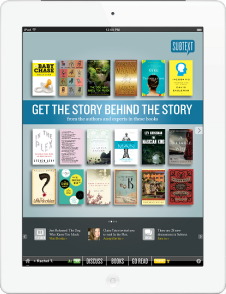 Now there’s this app,
Subtext,
that lets you read books and share your comments about them
in real-time with other people reading the same book. Little speech bubbles
in the margins pop up: you tap them, you get to read what other people are
saying about a particular plot twist, or character death, or whatever.
Now there’s this app,
Subtext,
that lets you read books and share your comments about them
in real-time with other people reading the same book. Little speech bubbles
in the margins pop up: you tap them, you get to read what other people are
saying about a particular plot twist, or character death, or whatever.
In some cases, the author has gone through and made a bunch of those comments him or herself, and these read a little like a DVD commentary track.
I mention this because I’m one of those authors: Machine Man is one of their launch titles. So, if, you know, you feel I’ve been too secretive about the creative process behind Machine Man so far, now is your chance for some insight.
At first I thought you would have to turn those comments off when reading a Subtext book, at least the first time through, because otherwise that would be really distracting. But I have found that this is impossible. You know the comments are lurking there, and it’s too much to resist turning them back on when you’re wondering, “Does anyone else think this story just completely went off the rails?”
So that’s pretty cool. Not from an author’s perspective. From an author’s perspective, it’s horrible. I want you to sit there and read what I’ve damn well written for you. But as another example of users seizing control over their own entertainment experiences, it seems significant.
Movie news! I just changed the subject. That’s what happened there. Mark Heyman, the scriptwriter of Black Swan, who’s been busy working on what I have to say is a freaking fantastic Machine Man script, I know I’m not allowed to tell anyone, Mandalay, BUT IT IS AWESOME, has sold his “Facebook thriller” script XOXO, with Darren Aronofsky producing. So it’s all going pretty nicely in Heyman-land. Syrup is deep in post-production and I still haven’t seen it, not that I’m thinking about it every ten minutes or anything. And the leads are busy: Amber Heard is doing interviews for The Rum Diary, and Shiloh Fernandez is becoming an eco-terrorist.
Nuts and Bolts
![]() I’m a little nervous about this, but here is the nerdiest thing I have ever done.
You realize that bar is already pretty high. I have programmed web games.
I have
considered domain name availability before naming my offspring.
But this is the first time I have publicly released a version control system history
of a book.
I’m a little nervous about this, but here is the nerdiest thing I have ever done.
You realize that bar is already pretty high. I have programmed web games.
I have
considered domain name availability before naming my offspring.
But this is the first time I have publicly released a version control system history
of a book.
I just lost you. I realize that. Unless you are some kind of freako super-geek, in which case, welcome to the tiny minority of the human race that may appreciate this. The rest of you: a revision control system is usually used for writing software, and tracking the changes you make. I used one of these for the Machine Man serial, since I was uploading a page per day, and it needed to be processed for sending out to people’s email inboxes and cell phones, and I lost you again, didn’t I? Okay.
The point is I have the entire edit history of Machine Man all the way back from notes. And you can browse to any particular page and see how it evolved from something to nothing.
Here is an example, using Version 1 of Page 18:
It’s just a note to myself about what this page might be about. By clicking the “→V2”, you move ahead to Version 2 of that page:
New words are green, deleted words are red. This page is hard to read because the software is making bad guesses about how the different versions fit together. In actuality, I simply deleted my note and wrote a first version.
Then I corrected a spelling mistake:
And continued tweaking in versions 4 through 9.
The final version is here. And if you have the book, you can follow along at home to the version that wound up in the novel:

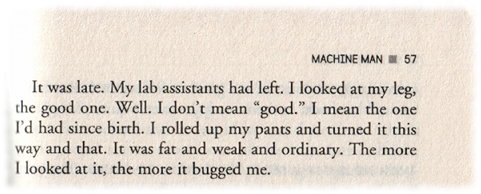
I’m not sure what use this is to anybody, other than for exposing my writerly fumblings in an even more humiliating manner than I’ve already done. But it was POSSIBLE, so I have DONE IT.
To access the Source version of a page in the Machine Man serial, click the tiny, near-invisible nut on the top-right of any serial page. Or append “&v=1” to the URL, if you’re that nerdy. Which, if you’ve read this far, you surely are.
Schlepping the Book
![]() I’d kind of forgotten what it was like to have a new book out. It’s like this:
I’d kind of forgotten what it was like to have a new book out. It’s like this:
- Some people are incredibly nice and love the book and take the trouble to say so, which makes you feel like kissing their toes
- Some reviewers say you are smart and you think, Hey, yeah, I am smart, I’m REALLY GODDAMN SMART
- Some reviewers mistake your book for something else entirely and you have to remind yourself it’s not a good look for an author to post angry comments listing their CLEAR FACTUAL AND CONCEPTUAL ERRORS
- You are invited to speak at festivals and bookstores and on radio, which causes you to gradually re-learn atrophied social skills like talking
- Your time for writing shrinks and you start to panic because you’re not getting enough one-on-one time with your work-in-progress, which loves and needs you
- Some people you haven’t heard from in years remember you exist
- Some people take the time to email you how much you suck, which often seems to be a reaction not to the book or to you exactly but rather the fact that you are receiving attention, which infuriates them for reasons that are hard to know
- Some people give oddly insulting compliments, like, “Of your four terrible books, this is at least fairly readable,” and honestly seem to expect you will be pleased to hear it
- You notice things in the book you wish you had done differently
- You kind of want to know how it’s selling but kind of don’t
- Some people don’t seem to realize you have a new book out, and how is that possible, you’re spending all this goddamn time doing interviews and blogs and book trailers, have they seen that book trailer, HOW CAN THEY NOT KNOW
Basically, a strange time. And that’s even without a US book tour, which is usually a whole added level of surrealism for me. But I replaced it with the Skype tour, so I guess it balanced out. Actually, the Skype tour was far more successful than I expected. Or, more specifically, it contained far less crazy than I feared. I’m not saying you people are crazy. Not all of you. It was just that I was pretty sure that at some point I would find myself talking to a person who wanted me to join his underground resistance movement, and read his manuscript. But that didn’t happen. So thank you to everyone for being so nice and sane. The best part of book tours is getting to chat to readers—well, that and the hotel room service—so it was like taking just that part and condensing it down.
Tomorrow I’m off to the Brisbane Writers Festival, but next week, guess what? A clean calendar! I’m really excited about that. That means I can write.
P.S. I just realized I should probably link to some of the promotion I’ve been doing. To, you know, promote. I’ve been uploading YouTube videos, how about that? Here’s one:
I Had to Make a Book Trailer
![]()
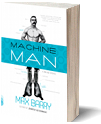 Machine Man
is out today. As celebration/punishment, I offer you
this
promotional book trailer.
Machine Man
is out today. As celebration/punishment, I offer you
this
promotional book trailer.
Skype with Max
![]()
 Also: win an original manuscript. I wasn’t sure which to go with as the blog
title. Which do you think is more alluring? It’s the manuscript, isn’t it? Well, it’s
too late for that now. Stop going on about it.
Also: win an original manuscript. I wasn’t sure which to go with as the blog
title. Which do you think is more alluring? It’s the manuscript, isn’t it? Well, it’s
too late for that now. Stop going on about it.
So two new promotions today. PROMOTION #1: WIN A MACHINE MAN MANUSCRIPT! This is a mid-2010 working draft of the novel that I scribbled notes over. It’s 413 pages. I don’t know how I’m supposed to mail that. The postage will ruin me. Anyway, you can win that, and magnets and books, if you enter before August 9 and live in the US or Canada. Yes, this one is a North American promotion. Don’t look at me like that. I don’t control the global publishing industry.
PROMOTION #2: SKYPE WITH MAX! Since I’m not doing a book tour, I decided to Skype myself around. That sounds kind of dirty. But the idea is you get the joy of my virtual presence with none of the body odor. It’s win-win. Basically I’ll call you and you have ten minutes to ask questions or show me your cats or whatever you like. Well. Not whatever. Keep your clothes on. But you get the idea.
To qualify for this, you buy three books. I had to pick a number that was low enough to be reasonable, yet high enough to prevent me spending the rest of my life delivering this promotion. So I chose three.
For this you can live anywhere in the world. You see, when it’s up to me, I remember my friends in far-off corners of the world, like England. I remember you.
P.S. I haven’t received my magnets yet, but when I do I’ll give some of those away to people outside of North America, too.
Antipodean Machines
![]()
 Machine Man is out in Australia and New Zealand today, because of the time
difference. We’re eight days and fourteen hours ahead of the US. I don’t know
if you knew that. It’s because the Southern Hemisphere rotates slightly faster
than the Northern Hemisphere. That’s why the seasons are different, too.
Also, most of what you think is an accent is actually just the
Doppler effect.
Machine Man is out in Australia and New Zealand today, because of the time
difference. We’re eight days and fourteen hours ahead of the US. I don’t know
if you knew that. It’s because the Southern Hemisphere rotates slightly faster
than the Northern Hemisphere. That’s why the seasons are different, too.
Also, most of what you think is an accent is actually just the
Doppler effect.
Anyway, the point is that residents of Australia and New Zealand should now be visiting bookstores and moving my book to more prominent positions. Bookstore owners say they hate that, but they’re just crotchety because of the whole collapsing industry thing. They’ll thank you when that eye-catching cover brings in more foot traffic.
Northern Hemispherians have to wait until next week. You know my Australian publisher did this specifically to annoy you. Not only that, but they’re running a promotion whereby antipodes can get a free e-copy with every print edition. I’m not sure how that helps anyone, come to think of it. I guess if you like the look and feel of print books but the convenience of digital, it’s good. Or if you want to test which medium you prefer by reading the exact same book once on each. If that describes you, details are craftily hidden on this page.
Dogs and Smurfs
![]() This has been a great year for male writers, with women shunted
aside for major prizes and all-new hand-wringing about why it is so.
Because, I don’t know if you’ve noticed, but male writers get taken
more seriously. Also, stories about men, even if written by women,
are considered mainstream, while stories about women are “women’s fiction.”
This despite the fact that women read more than men, and write
more, and are over-represented generally throughout publishing.
This has been a great year for male writers, with women shunted
aside for major prizes and all-new hand-wringing about why it is so.
Because, I don’t know if you’ve noticed, but male writers get taken
more seriously. Also, stories about men, even if written by women,
are considered mainstream, while stories about women are “women’s fiction.”
This despite the fact that women read more than men, and write
more, and are over-represented generally throughout publishing.
As the father of two girls, one aged five and one ten months, I know why. It’s because of dogs and Smurfs. I can’t understand why no-one else realizes this. I see these knotted-brow articles and the writers seem truly perplexed. Dogs and Smurfs: that’s the answer.
Let me walk you through it. We’ll start with dogs. I have written about this before, but to save you the click: people assume dogs are male. Listen out for it: you will find it’s true. To short-cut the process, visit the zoo, because when I say “dogs,” I really mean, “all animals except maybe cats.” The air of a zoo teems with “he.” I have stood in front of baboons with teats like missile launchers and heard adults exclaim to their children, “Look at him!” Once I saw an unsuspecting monkey taken from behind and there was a surprised silence from the crowd and then someone made a joke about sodomy. People assume animals are male. If you haven’t already noticed this, it’s only because it’s so pervasive. We also assume people are male, unless they’re doing something particularly feminine; you’ll usually say “him” about an unseen car driver, for example. But it’s ubiquitous in regard to animals.
Now, kids like animals. Kids really fucking like animals. Kids are little animal stalkers, fascinated by absolutely anything an animal does. They read books about animals. I just went through my daughter’s bookshelves, and they all have animals on the cover. Animals everywhere. And because publishing is terribly progressive, and because Jen and I look out for it, a lot of those animals are girls. But still: a ton of boys. Because of the assumption.
Here’s an example: a truly great kids’ book is Lost and Found by Oliver Jeffers. I love this story, but on page 22, after being called “it” three times, an otherwise sexless penguin twice becomes “he.” This would never, ever happen the other way around. The only reason a penguin can abruptly become male in an acclaimed children’s book without anybody noticing is because we had already assumed it was.
Then you’ve got Smurf books. Not actual Smurfs. I mean stories where there are five major characters, and one is brave and one is smart and one is grumpy and one keeps rats for pets and one is a girl. Smurfs, right? Because there was Handy Smurf and Chef Smurf and Dopey Smurf and Painter Smurf and ninety-four other male Smurfs and Smurfette. Smurfette’s unique personality trait was femaleness. That was the thing she did better than anyone else. Be a girl.
Smurf books are not as common as they used to be, but Smurf stories are, oddly, everywhere on the screen. Pixar makes practically nothing else. I am so disappointed by this, because they make almost every kids’ film worth watching. WALL-E is good. I will grant them WALL-E, because Eve is so awesome. But otherwise: lots of Smurfs.
Male is default. That’s what you learn from a world of boy dogs and Smurf stories. My daughter has no problem with this. She reads these books the way they were intended: not about boys, exactly, but about people who happen to be boys. After years of such books, my daughter can happily identify with these characters.
And this is great. It’s the reason she will grow into a woman who can happily read a novel about men, or watch a movie in which men do all the most interesting things, without feeling like she can’t relate. She will process these stories as being primarily not about males but about human beings.
Except it’s not happening the other way. The five-year-old boy who lives up the street from me does not have a shelf groaning with stories about girl animals. Because you have to seek those books out, and as the parent of a boy, why would you? There are so many great books about boys to which he can relate directly. Smurf stories must make perfect sense to him: all the characters with this one weird personality trait to distinguish them, like being super brave or smart or frightened or a girl.
I have been told that this is a good thing for girls. “That makes girls more special,” said this person, who I wanted to punch in the face. That’s the problem. Being female should not be special. It should be normal. It is normal, in the real world. There are all kinds of girls. There are all kinds of women. You just wouldn’t think so, if you only paid attention to dogs and Smurfs.
Is it the positive role model thing? Because I don’t want only positive female role models. I want the spectrum. Angry girls, happy girls, mean girls. Lazy girls. Girls who lie and girls who hit people and do the wrong thing sometimes. I’m pretty sure my daughters can figure out for themselves which personality aspects they should emulate, if only they see the diversity.
It’s not like this is hard. Dogs and Smurfs: we’re not talking about searing journeys to the depths of the soul. An elephant whose primary story purpose is to steal some berries does not have to be male. Not every time. Characters can be girls just because they happen to be girls.
P.S. Don’t talk to me about Sassette. Sassette was like the three millionth Smurf invented. You get no credit for that.
Magnets: How do they get into my possession?
![]() Machine Man the novel is out August 9, unless you live in one
of those countries that hates me, like the UK. Seriously, UK. What have I
ever done to you? Aside from those
Bedford blogs. Those were totally
justified. Bedford is horrible.
Machine Man the novel is out August 9, unless you live in one
of those countries that hates me, like the UK. Seriously, UK. What have I
ever done to you? Aside from those
Bedford blogs. Those were totally
justified. Bedford is horrible.
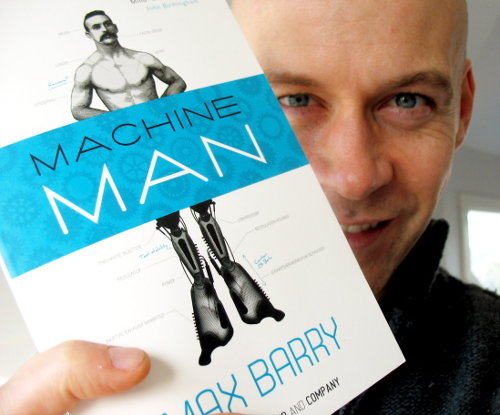 Anyway,
the point is: look at me with this actual book! The publishers
have started printing. A couple days ago I was asked
whether I’d miss the sensation of holding a physical copy of my book,
since I allegedly believe ebooks are destined to take over from print.
And as much as I wanted to say no, because, hey, bring on the electrons, the answer
was yes. I do find it incredibly rewarding to hold my book, made real. I mean made physical.
Ebooks are real. I never said otherwise. But a thing, a touchable, material
thing, does validate the book’s existence in a straightforward and
undeniable way. When I
dreamed of being a published writer, I was mostly imagining a shelf full
of physical objects. Those objects may not be important, in the long run. They may
be the medium and nothing more. But boy, they are something.
Anyway,
the point is: look at me with this actual book! The publishers
have started printing. A couple days ago I was asked
whether I’d miss the sensation of holding a physical copy of my book,
since I allegedly believe ebooks are destined to take over from print.
And as much as I wanted to say no, because, hey, bring on the electrons, the answer
was yes. I do find it incredibly rewarding to hold my book, made real. I mean made physical.
Ebooks are real. I never said otherwise. But a thing, a touchable, material
thing, does validate the book’s existence in a straightforward and
undeniable way. When I
dreamed of being a published writer, I was mostly imagining a shelf full
of physical objects. Those objects may not be important, in the long run. They may
be the medium and nothing more. But boy, they are something.
Some promotional stuff is brewing. First, if you’re in Australia, Scribe is doing a very cool thing whereby you can buy the print version and get a Booki.sh e-copy for free. See here under “ebook bundle”. If you’re not in Australia, and can get to San Diego for Comic-Con 2011, Vintage will be giving away Advanced Reader Copies* and more importantly AWESOME MAGNETS. Look at these things. You can mix and match human and artificial parts. You know you want that more than life itself. That isn’t just me.
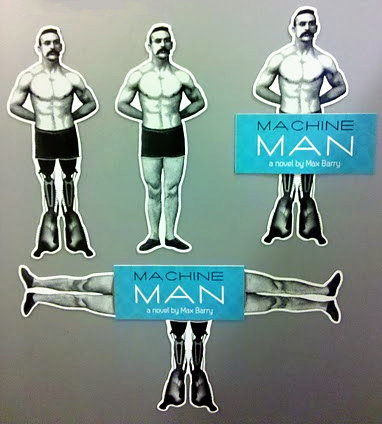 If
you can’t get to San Diego, you can win magnets and possibly something else
via a competition I haven’t invented yet. The important thing is I promise
there will
be access to magnets. Stay tuned. And suggest some competition ideas. Because
seriously, I need to think of something.
If
you can’t get to San Diego, you can win magnets and possibly something else
via a competition I haven’t invented yet. The important thing is I promise
there will
be access to magnets. Stay tuned. And suggest some competition ideas. Because
seriously, I need to think of something.
Finally: US book tour. There isn’t one. Or at least, not a physical one. This is mainly because flying an author thousands of miles to sell three dozen copies of a book is not very cost-effective. Especially when that author tends to order a lot of room service and make long international phone calls. But also because I have an idea for a virtual book tour, which is cheaper and appropriate for the novel and solves the problem of people complaining I’m visiting every city in the world except their one. Details to come on that, too. I just wanted to let you know early so you’re not hanging around postponing your vacation in case I come to Tallahassee that precise weekend. Go ahead. Book the flight. You deserve it.
(* Advanced Reader Copies are early versions given out to reviewers and bloggers and, for some reason, Comic-Con 2011 attendees. Sometimes these wind up on ebay and people like you wonder if they should buy them. I think they make neat collectibles, but they’re inferior to the final book in three ways: the text is uncorrected, meaning it contains typos and things I changed at the last minute, the cover and front/back matter is different, and the production quality of the book itself is lower. Also I don’t get paid for ARCs. So that’s four ways.)
I’m a Star
![]() On Tuesday I had my Syrup cameo. I was not as nervous about this as I’d expected,
until it came time to do it, at which point I was seized with terror. This was because
everyone around me seemed to know exactly what they were doing and be
very good at doing it, while I’m a writer who can’t act. I knew that whenever
something went wrong during a shot, people would shout out, “RESET, RESET,”
or “CUT” or “MAX BARRY GODDAMMIT HOW HARD IS IT TO TAKE ONE STEP
TO YOUR RIGHT” (probably), and did not want to waste everyone’s time.
They were doing such an incredible job; why was I making it harder? My very
presence was an insult, implying that anyone could do this. If an actor
wanted to insert a few sentences into a novel I was writing, how would I feel about that?
Like no freaking way was that happening, that’s how.
On Tuesday I had my Syrup cameo. I was not as nervous about this as I’d expected,
until it came time to do it, at which point I was seized with terror. This was because
everyone around me seemed to know exactly what they were doing and be
very good at doing it, while I’m a writer who can’t act. I knew that whenever
something went wrong during a shot, people would shout out, “RESET, RESET,”
or “CUT” or “MAX BARRY GODDAMMIT HOW HARD IS IT TO TAKE ONE STEP
TO YOUR RIGHT” (probably), and did not want to waste everyone’s time.
They were doing such an incredible job; why was I making it harder? My very
presence was an insult, implying that anyone could do this. If an actor
wanted to insert a few sentences into a novel I was writing, how would I feel about that?
Like no freaking way was that happening, that’s how.
So I felt indulgent. But of course every person I spoke to was completely encouraging and happy for me, so it may have been all in my head. Anyway, I completely nailed the “neurotic” part of actor right off the bat.
I was a waiter. In an earlier blog I said I was going to be an exec in a strip club—which I really should have mentioned to my wife before the day I was leaving, I discovered—but the schedule changed so instead I was a waiter. I had a line but convinced the director to drop it, because I lost confidence in being able to make recognizable sounds out of my talking hole. Instead I mostly just stood next to Amber Heard and gave her things while she delivered a monologue about feminism in the workplace. This was a good match of roles to talents. I was like the caddy of a great golfer, if the golfer was world-class and beautiful and at one point wearing a corset, and the caddy had never held a club before and was concentrating on not swallowing his own tongue.
Here’s me paying intent attention to the director, Aram:
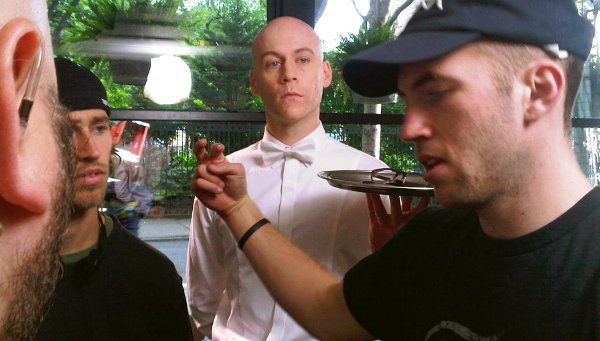
Beside me is Shane, a very cool guy who I talked to a lot on set; he’s a producer who in this moment is standing in for Amber. I must be standing on a box or something because no way is Shane this short. That’s some kind of film trickery. The ear belongs to Scott, whose job is to herd people into the right positions at the right time by bellowing instructions. He is awesome. Everyone is awesome. Julio Macat, the cinematographer, who I wish I got a pic with but never did, is flat-out brilliant and a genuinely lovely human being. Every day I was on set I learned more about what these people do and how good they are at doing it.
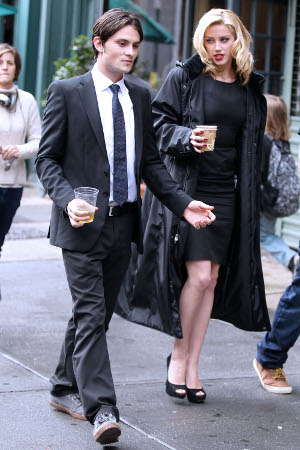 A lot of exterior shots were filmed that day and next, so the internet filled with
paparazzi pics. I think I am supposed to be disappointed at, you know,
these vultures suckling at the teat of celebrity, but come on, HOW COOL DO THESE LOOK.
A lot of exterior shots were filmed that day and next, so the internet filled with
paparazzi pics. I think I am supposed to be disappointed at, you know,
these vultures suckling at the teat of celebrity, but come on, HOW COOL DO THESE LOOK.
No-one felt a need to take a paparazzi shots of me, for some reason. I had to do it myself. So here is me in my trailer on the day of my cameo. (I don’t know why I got a trailer.)
Then I flew home to Melbourne, Australia. Which was heartbreaking, because I want to live on that film set for the rest of my life, but also wonderful, because I got to hold my girls (three new teeth for Matilda. Three!) and sleep for longer than five hours and get back to writing things.
This trip was amongst the most hands-down incredible things I’ve ever experienced. It was astonishing on many levels: hearing actors delivering lines I wrote, seeing characters and locations I’d imagined coming to life, being embraced so warmly by the cast and crew, watching how films actually get made, surviving a cameo. I’m so grateful to every person involved. And I know nothing will ever beat it: that even if I’m fortunate enough to have more work produced, it won’t be like this first time, where reality smashed through the ceiling of my expectations and kept heading up. I went over there fully prepared to be disappointed, at least in some respects. And I was wrong. This is going to be a good movie.
Perfect Day
![]() I woke at 3:35am and couldn’t find sleep so decided to get up and walk 30 or 40 blocks to location. At dawn, Manhattan was astonishingly still.
City That Never Sleeps? I thought. More like City That Never Gets Up. This seemed funny because it was my fifth day in a row with less than four hours sleep. I’m basically only functional thanks to to the adrenaline of having my book turned into a movie. I walked through the Flower District, which is what I assume that street with nothing but flower shops is called, and Madison Square Park, where I once saw an outdoor film, and, without warning, found myself in Union Square, staring at the bookstore where I gave my first ever book reading from Syrup in July 1999.
I woke at 3:35am and couldn’t find sleep so decided to get up and walk 30 or 40 blocks to location. At dawn, Manhattan was astonishingly still.
City That Never Sleeps? I thought. More like City That Never Gets Up. This seemed funny because it was my fifth day in a row with less than four hours sleep. I’m basically only functional thanks to to the adrenaline of having my book turned into a movie. I walked through the Flower District, which is what I assume that street with nothing but flower shops is called, and Madison Square Park, where I once saw an outdoor film, and, without warning, found myself in Union Square, staring at the bookstore where I gave my first ever book reading from Syrup in July 1999.
(Edit: I am mixing up my locations. In the comments, Nic Woolf informs me that my first reading was at Astor Place, not Union Square. I think this is right. Union Square was where my first agent, Todd Keithley, had his office when he sold Syrup to a publisher.)
Today began in pure joy, with no trepidation about what to expect. I knew it was going to be awesome and just felt happy to be exactly where I was.
In the morning, we shot some footage of Scat being dragged into a corporate office:

I then had my costume fitting for my cameo role on Tuesday. But I am skipping right over that because I want to talk about what happened in the afternoon. And please forgive for indulging in detail, but I want to get this all down, because it is so very important to me.
The afternoon was Amber Heard’s first scene. I hadn’t had the opportunity to see Amber in anything much before, and what I did see, she was not very 6-like. Aram, the director, had sworn to me that she was perfect for this role, but I was still anxious, because, like I mentioned yesterday, 6 is special to me. I was bracing myself for the inevitable realization that she was not going to be portrayed just like I had imagined.
We were shooting at the top of the Met-Life building, where thick mist turned what should have been a glorious vista over Central Park into an otherworldly diffuse light that was actually far more interesting.

I didn’t know what the hell we were doing here, because when I wrote this scene it was set in an office corridor.
In it, 6 is fuming about a character trying to usurp her (named @ in the book, Three in the movie). 6 fumes a lot in Syrup. It is a core part of her. And what I was most afraid of was an actress interpreting this as a weakness. A flavor of helpless frustration, instead of honest anger. This is important to me not only because it goes to the heart of who 6 is, but also because the way women are demeaned in the workplace for showing emotion drives me fucking insane. (Latest example: here.) 6’s dismissal of male expectations of female behavior is one of her best qualities.
So anyway. Amber Heard turns up. She is blond. I struggle a little with that. But I’m prepared to go with it. It’s a very severe blonde. Then they set up the scene and Amber starts pacing. She radiates fury and is fearsome and so, so 6.
Then she and Scat exchange a series of lines that I first wrote in the book and reworked into their current form over five drafts and four years. Writing those drafts involved more bullshit than I can possibly describe. For a long time I wrote all day and ate dinner then went back and wrote more, seeing my family for a grand total of about thirty minutes a day, in the service of those drafts. And after enough of this, I decided it was all for nothing, because it was probably never going to be produced.
This scene looks astonishingly beautiful, because instead of the simple office corridor I imagined, it’s taking place in this striking corporate-industrial cavern. And watching this, where everything was either exactly as I imagined or else better, which I had given up hope of seeing, just broke me. I cried. Later, when I went out to call Jen and tell her what had happened, how all that shit hadn’t been for nothing, I cried again.
I’m sleep-deprived. I’m a little weepy about everything. But I will never forget this day.
It’s Definitely Real: Syrup Shoot, Day 1
![]() First I saw a bunch of trucks. Yesterday I asked the producer where exactly I might find this location; like, would I need an apartment number? And he laughed at me, because, no, I could just look for the trucks.
First I saw a bunch of trucks. Yesterday I asked the producer where exactly I might find this location; like, would I need an apartment number? And he laughed at me, because, no, I could just look for the trucks.
Here is me meeting the director, Aram Rappaport, for the first time without a Skype connection. I am grinning like a kid on Christmas morning because of all the trucks. And the people carrying stuff. And the trailers with names on the doors that say SCAT and SIX* and SNEAKY PETE.
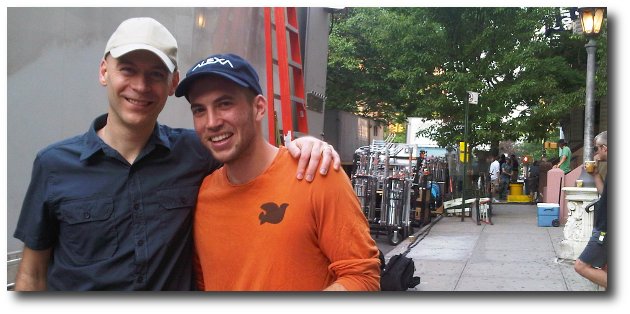
Inside the building, four rooms were dressed as Scat & Sneaky Pete’s apartment and the rest were for monitors and thick cables and busy people and electrical equipment worth more than my house. It was so authentic I didn’t realize this at first. I don’t know what I thought; maybe that we were passing through someone’s disheveled bedroom en route to the warehouse with the wooden sets. But then it was gently explained to me.
When writing, I tend not to imagine physical details very precisely. I get a strong feeling for personalities and emotions, but what stuff looks like, that doesn’t really bother me. Here were those vague, floating impressions given weight and detail. It was freaking amazing.
Here I am in Scat & Sneaky Pete’s living room.

A lot of people were very busy carrying stuff and testing things and then filming began. I watched this on a monitor in another room, with a set of headphones to hear what people were saying. It was without doubt the most surreal experience of my life. I’m not sure I can explain this any better than to simply say that a whole bunch of highly talented people began to recreate with astonishing fidelity stuff I once dreamed up. It was hard to shake the feeling that they were doing it just for my personal benefit. Like I had a terminal illness and this was my Make-A-Wish. The very first scene filmed was the one where Scat bursts into Sneaky Pete’s bedroom and says, “I have an idea.” I guess this was chosen for sensible logistical reasons, but, boy, was it eerily perfect.
It was also my first look at Shiloh Fernandez, outside of “Red Riding Hood” trailers, and holy hell, he is wonderful. He said lines and they magically became way better than they sounded in my head. He was Scat sprung to life. (People call him “Scat” even when he’s not acting, which reinforced my feeling that I had invented him.)
Sneaky Pete is different, because in the book he’s Asian and in the film he’s Kellan Lutz. He has the silent shtick but for different reasons, so he’s more like a new character, rather than a hallucination made material. Throughout the day I felt this difference between stuff that was different from the book, which was merely fearsomely cool, and stuff that was the same as the book, which was like having my brain excavated.
I have a lot more respect for actors than I did twelve hours ago. They deliver a line with the exact same feeling ten times in an hour while being bombarded with instructions on where to stand and exactly how far to lean forward and can you do that with your left hand instead of your right and by the way the entire crew is waiting for you to get this exactly right so no pressure. It makes me feel like a chump because when I get tired or lose interest during my job, I just go get a snack or check my email.
I have more respect for the sheer volume of time and talent that is poured into creating a few seconds of good cinema. It seems kind of appalling to me now that I can dash off a couple lines with no regard for lighting or sound or framing or whether the camera operator’s knees can actually bend that way. (The camera operator is basically a circus strongman wearing a Transformer. The physical demands of what this guy does for ten or twelve hours in a day I cannot comprehend.) So much of what I do I actually leave up to you, the reader. A film needs to fill all that in, so around my words people are pouring in new ideas, making it expand as it solidifies.
At the end of the day, I met Shiloh and Kellan and found them to be incredibly friendly and charming. I feel so grateful to these guys for not sucking. I should probably think of a better way to express that. What I mean is: you know when you have an awesome dream and you try to explain it to someone? And as it’s coming out of your mouth you realize this actually sounds incredibly lame. These guys are making the dream sound awesome.
I seriously can’t shake the feeling that I’m talking to Scat.
Tomorrow there’s the first scene with 6, played by Amber Heard, which I can’t wait to see because 6 is very dear to me and god help Amber if she screws this up. Actually I’m just really excited. I’ve had a few sleepless nights about how this is going to turn out but now I’m blissing. It won’t be just like how I imagined, of course, or an exact reproduction of the book; neither of those would make good movies. Instead there is a spirit here that feels exactly like what I was trying to capture almost 15 years ago, and a bunch of incredibly dedicated, smart people from the director down working harder than I ever have to make it happen.
(* “Six” is wrong, of course. It’s 6, the number. I pointed that out to the the producer, trying to be funny, and he assured me it would be fixed as soon as possible, but maybe not right away because everyone was so busy. So then I felt like an asshole.)
It’s Possibly Real
![]() Tomorrow I fly to New York for the Syrup movie.
They’re about to start production; I get to hang out on set. On the 14th I am supposed to act: I have a cameo as an executive in a strip club scene.
Tomorrow I fly to New York for the Syrup movie.
They’re about to start production; I get to hang out on set. On the 14th I am supposed to act: I have a cameo as an executive in a strip club scene.
This is all pretty insane. As I mentioned, I’ve only just started to believe this film is happening. Prior to now, my experience with Hollywood has been mostly getting promised things. I learned to adopt an “I’ll believe when I see it” attitude. Apparently I’m about to see it.
A part of me is occasionally paralyzed with fear as to how this thing will turn out. I’m trying to keep that under control, and instead remember how I sat in my 1979 Toyota Corolla (street value: $200) and typed this novel out across a couple hundred lunch breaks from my job as a sales rep. I was 23 years old. That guy dreamed of this. He would be awe-struck that it’s happening. Not completely, because he was kind of arrogant, and expected nothing less than greatness. But still. I’m taking that guy to New York with me.
P.S. I will tweet what I can.
Day of the ‘Stache
![]() Last week I asked which Machine Man cover concept
you liked best. And there were all kinds of opinions. But once I
nerded up and crunched the numbers*,
it became clear. You like the ‘stache.
Last week I asked which Machine Man cover concept
you liked best. And there were all kinds of opinions. But once I
nerded up and crunched the numbers*,
it became clear. You like the ‘stache.
Here are the covers in question. If you’re not seeing a graph, try this. If you are, and you enjoy playing with graphs, you can click site names in the legend to add and remove them. I mention that because it’s awesome fun.
I separated votes by domain because there were interesting differences depending on whether you responded on my site, Reddit, tumblr, or Facebook.
Observations:
- In all cases, Cover #5 (Victorian-era dude with enormous ‘stache) was most popular. This was a surprise because I’d thought it was just too weird. In retrospect, I was probably headed for that trap of trying to imagine what other people might like, which is always a sure path to something conservative and uninteresting. So this was a handy reminder to not do that. Many people responded very positively to the originality of this design and were turned off by the same-ness of some others.
- Cover #3 (Millions o’ Parts) was least popular. This was lucky, because it was the design that started this whole debate with my publisher, and if it turned out that people actually liked it best, I would have been an asshole. The votes also seemed to back up my thesis that it appealed more to arty types than geeks, with it being quite popular on tumblr but abhorred on Reddit (where there were actually more negative comments than positive ones).
- Covers #4 (Smoking Capacitor) and #6 (Smoking Processor), which were deliberately similar to the style of my previous covers in Jennifer Government and Company, were a lot more popular with people who knew that (i.e. people on maxbarry.com and my Facebook page).
- Reddit liked Cover #2 (the Robot) a great deal, practically as much as the ‘Stache. I suspect this is due to an affection for retro robots (something I share). A few people observed that it was less true to the story than #5, though.
- Cover #1 (Pixelated Guy) I think suffered from a general feeling that this kind of thing had been done before. It was seen as pleasant but not particularly arresting.
If you were wondering, covers #3 and #6 were designed by Vintage, cover #4 by me, and covers #1, #2, and #5 by up-and-coming design superstar Matt Roeser. I didn’t mention that earlier to avoid prejudicing votes.
Comment of the week, from G Lainagier:
In numerical order: Couplandesque cubicle farce, Rankinesque steampunk, Kathy Lette tries something new, Tom Clancy for the kids of today, what you wrote, what you might write but not really this.
I also enjoyed seeing Caleb’s battle against indecision, as he transitioned over the course of three comments and several hours from saying #6 was terrible to liking it the best.
I forgot to mention earlier that most of these covers were concept sketches, not finalized designs. With #5, for example, a few people criticized the machine legs, which were only supposed to be placeholders. I’m now working with Matt and the publisher to refine that. I promise you, those legs will be awesome. Also: the ‘stache stays.
Thank you again to everyone who helped out with this. You are the burning propulsive mass beneath my rocket boots.
* Nerd details: I assigned a weighting to expressed preferences: 3 points for most preferred, 2 points for any second preference, down to -2 for last preference, if one was mentioned. When people said they liked multiple things equally, I alternated entering them in the order listed or in reverse. To allow opinions on different sites to be compared, despite very different numbers of respondents (about 260 on maxbarry.com, 390 on Reddit plus a thousand-odd votes, 70 on tumblr, and 50 on Facebook), I scaled the results: the most popular choice is scored as 1,000 and other covers based on their relative popularity on that site. A cover exactly half as popular as the top choice, for example, on whichever site, has a column exactly half as tall. Note that this exaggerates a single person’s vote on Facebook and tumblr: the Reddit and maxbarry.com columns represent many more people’s opinions.
On Reddit, where users can endorse another person’s comment by upvoting it, I multiplied the score of each comment by the number of upvotes. But since users can upvote multiple comments, even comments saying the same thing, I took the square root of each result in order to minimize the exaggeration that would have otherwise occurred. (Without this, the more popular covers on Reddit appeared wildly more popular.) When highly upvoted comments expressed equal preferences for multiple covers, I assigned equal scores, rather than relying on the averaging nature of the alternating system mentioned earlier.
Freaking Syrup movie
![]() I’ll be honest: I never expected this to get made. In fact, I’m still skeptical.
I’m that cynical. It’s Hollywood, man. It eats you. But now there’s a cast
and a budget and a production date and I’m starting to think it could be real.
I’ll be honest: I never expected this to get made. In fact, I’m still skeptical.
I’m that cynical. It’s Hollywood, man. It eats you. But now there’s a cast
and a budget and a production date and I’m starting to think it could be real.
 This was supposed to be announced tomorrow, but word leaked out early
and Variety
reported it,
so: they’re making
Syrup.
It’s what comingsoon.net
kindly calls
a “smaller production,” starring
Shiloh Fernandez
and Amber Heard.
It’s based on a script I wrote, is to be
directed by Aram Rappaport, and will shoot in June in New York City.
This would be (will be, will be)
the first of my novels to be filmed.
This was supposed to be announced tomorrow, but word leaked out early
and Variety
reported it,
so: they’re making
Syrup.
It’s what comingsoon.net
kindly calls
a “smaller production,” starring
Shiloh Fernandez
and Amber Heard.
It’s based on a script I wrote, is to be
directed by Aram Rappaport, and will shoot in June in New York City.
This would be (will be, will be)
the first of my novels to be filmed.
I am totally flying over there and doing some kind of cameo. I’m looking forward to seeing sets. I don’t know why. But I always imagine locations pretty clearly—more so than the characters, in the physical sense—and I want to see the chair that Scat swivels around in. I know it won’t be just as I imagined. But it will be something in my head made real.
Choose the Machine Man cover!
![]() Something wonderful happened the other week: my editor asked what I thought about a proposed Machine Man cover. To appreciate how wonderful this is, you need to understand the usual process of publisher-author cover consultation. It goes like this:
Something wonderful happened the other week: my editor asked what I thought about a proposed Machine Man cover. To appreciate how wonderful this is, you need to understand the usual process of publisher-author cover consultation. It goes like this:
- Publisher develops cover in secret laboratory guarded by Dobermans
- Publisher emails author a JPEG, accompanied by text emphasizing how much everyone they’ve shown this image to loves it and believes it to be a surefire winner
- Publisher puts image on the cover
You notice there are no steps where the author does anything. I have tried to insert that step in the past, first with Syrup and then Company, but without much success. (To be fair, I was wrong about Company. That is a great cover. I was right about Syrup, though.)
This time, however, my editor at Vintage was ready for discussion. I don’t know why. I didn’t want to ask in case that accidentally provoked him into regaining his senses. But I made a few suggestions, even mocked up prototypes of my own, and Vintage responded with even more images.
Then I became really arrogant and demanding. It was around this point I realized why publishers don’t involve authors in cover discussions. Because I still wasn’t really in love with any of the cover ideas we had. And the cover is so important. Not just because it helps sales (although there is that): it also colors the story within. It’s the first thing you see and it stays with you as you turn the pages.
So next we brought on board indy designer Matt Roeser. This guy is incredibly talented and has somehow not been hired by anyone yet: this is potentially his first gig. Go look at his website; it’s beautiful. Anyway, once Matt had done his thing, we had six potential covers. Since I was already being a prima donna, I said, “I should post this online and ask people what they think.” And Vintage agreed! Like I say, it’s crazy. So here we are. Behold!
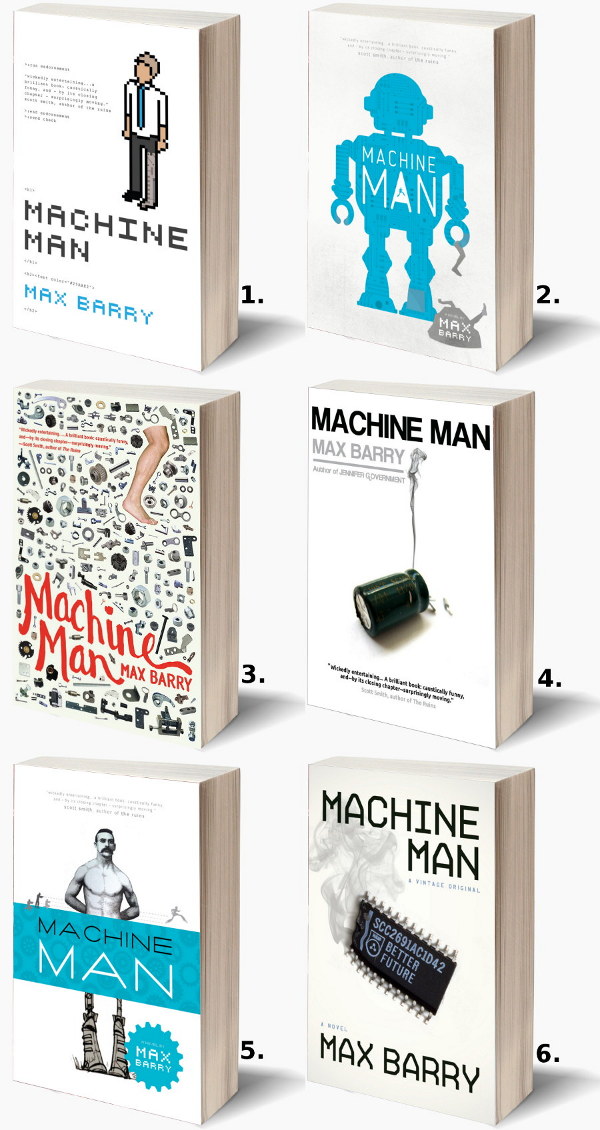
Here are larger versions of each image: 1 · 2 · 3 · 4 · 5 · 6.
Now we reach the part where you tell me which you like. There’s a comment link right there. I also posted to Reddit, because that’s where I drew a lot of inspiration for my main character’s personality. I’m not saying the site is full of misunderstood technology-obsessed geeks who would chop off their own hands if they could replace them with something WiFi-enabled. I’m just saying it was very helpful creatively. Also, I thought it was important to get opinions from people who don’t already like me. You’re wonderful people, you who visit me here. But you’re one hell of a sampling bias.
Please let me know what you think! Any and all feedback is much appreciated. And thank you to Vintage for being cool enough to let me do this. INSANELY COOL, if you know what I mean. I’m emphasizing INSANE. Oh. You got that? Okay.
Why I fled the office cubicle
![]() There are two types of employee: people and human resources. It’s easy to tell which one you are. If your boss says, “Todd, please have your team reach a final decision,” you’re a person. If she says, “Todd, please organize a team meeting, and because it’s lunch-time remember you should supply food, and please cut the breads or sandwiches into either halves or quarters, to discourage over-eating, and remember that crumbs and spills attract uninvited guests,” you’re a human resource. And you work for the New York City Department of Health.
There are two types of employee: people and human resources. It’s easy to tell which one you are. If your boss says, “Todd, please have your team reach a final decision,” you’re a person. If she says, “Todd, please organize a team meeting, and because it’s lunch-time remember you should supply food, and please cut the breads or sandwiches into either halves or quarters, to discourage over-eating, and remember that crumbs and spills attract uninvited guests,” you’re a human resource. And you work for the New York City Department of Health.
The difference between people and human resources is that people have brains. People don’t need a company policy on how to ascend stairs (stay left, hold the handrail at all times, look straight ahead: GE). People can figure that out for themselves. Human resources, on the other hand, are dumb as a box of hammers. They need everything spelled out. Human resources are basically office equipment with legs. They’re talking furniture. In fact, they’re worse than furniture, because at least furniture stays where you put it. It doesn’t have body odor, or forward chain e-mails, or stop by to tell you about their sick cat.
The Department of Health has taken a lot of heat over the last ten days for its “Life in the Cubicle Village” memo, a set of excruciatingly detailed guidelines for employees moving into its new offices in Long Island City this month. Some found it insulting to receive instructions on how to, for example, tell a co-worker they’re busy (“I’m in the middle of something. May I drop by or call you later [give a specific time]?”). Or to be told to avoid eavesdropping on cubicle neighbors (“If that fails, at least resist the urge to add your comments.”). Some thought the specifications on acceptable light snacks during meetings (“drinks cannot contain more than 25 calories per 8 ounces”) to be a little heavy on the micromanagement.
But these rules are totally necessary. Have you ever worked in an office? Then you know what I’m talking about. Some of these human resources are animals. If there weren’t company guidelines on how to navigate the revolving front door (wait for people inside to fully exit before stepping in: ExxonMobil), they’d never get past the lobby. They don’t actually follow the guidelines, of course. There are emails about the guidelines, they’re mentioned in the all-staff meetings, they’re on the cork board beside the coffee machine, but somehow still these people remain oblivious. Some do it on purpose. They deliberately flout the guidelines. You know that guy? Yeah. That guy. When he leaves half an inch of gritty black goo in the bottom of the percolator, he knows what he’s doing. He knows you’re going to stop by with exactly ninety seconds before being locked in a two-hour meeting on synergizing coalistics and all you want in the world is a quick caffeine hit. He enjoys your frustration. It’s what he lives for. It’s why he comes in every day. It sure isn’t to do any work. The man is useless. You will never understand why management can’t see that.
But I digress. The point is: human resources need rules. You don’t. You’re a person. To you, such minutia is not merely unnecessary, and not only an insult: it’s a challenge. Someone says you must cut bagels into halves or quarters, you know what you’re going to do? Frickin’ thirds. That’s right. Enjoy your bagel thirds, people. Because oppression foments rebellion. That’s what King George III didn’t realize. You can’t treat people like idiots. Not people people.
You’ll notice that managers are people. This is why the guidelines never apply to top brass. Sure, they’ll pretend to abide by them, to set a good example. But that’s for show. You don’t pay a CEO five million bucks a year to follow a set of instructions that could be performed by a well-trained monkey. CEOs should be using their initiative. Getting creative. Shedding outdated thinking. Pioneering new markets. You can’t do that by following the book.
But for the rest of us: guidelines. It’s because we’re living on top of each other. In the old days, when men were men and men had offices, it didn’t matter whether someone wore strong cologne. It would bother you for about eight seconds, as they passed by. With offices, loud personal conversations happened behind closed doors. We didn’t need guidelines on what constituted an acceptable ring-tone. Well. There were no ring-tones, obviously. But if there had been, it wouldn’t have mattered. Because of offices. Offices with doors.
Now it’s all open plan. It’s rolling cubicle farms. You know what we’re becoming? Singapore. It’s illegal to chew bubble gum in Singapore because everybody lives within earshot of five million other people. You can’t have that kind of population density without totalitarian social rules. That’s what these workplace guidelines are: blueprints for a new, cramped society.
I got out. I couldn’t take it any more. Now I work from home. My smells are my business. No-one leaves the coffee pot technically-not-empty but me. It’s not all upside. I miss the steady paycheck. I miss being able to go to the bathroom and think, ‘I’m getting paid for this.’ But I don’t miss the guidelines. I do like being a person.
Tomato parable
![]() I wrote some code to embed my tweets on my website.
There’s a statement that would have made no sense in 1990.
Actually, it barely makes sense now. But I did it. I’m proud
of my site. I built it myself. Occasionally
I get an email saying, “What software do you
use to run your site and how do I get it?” I think the answer is:
receive a Commodore 64 for your tenth birthday and no good
games.
I wrote some code to embed my tweets on my website.
There’s a statement that would have made no sense in 1990.
Actually, it barely makes sense now. But I did it. I’m proud
of my site. I built it myself. Occasionally
I get an email saying, “What software do you
use to run your site and how do I get it?” I think the answer is:
receive a Commodore 64 for your tenth birthday and no good
games.
But that’s not why I’m writing. I’m writing because I decided to grow my own vegetables. A few people I knew were growing their own vegetables, and they kept yakking about how wonderful it was, not depending on manufactured supermarket vegetables, which are evil for some reason, so I thought what the hell.
For a while I was intimidated by the idea of growing vegetables. When I reach for a vegetable, I usually just want to eat it. I don’t want to be intimately involved with its creation. I worried I would end up spending more time tending to the health of fragile, overly complicated peas than eating them.
Then I saw an ad for genetically modified seeds. These promised to take the hassle out of growing vegetables, which seemed pretty intriguing. The tomatoes would be big and red and I wouldn’t have to do anything. So I got those.
This upset my hippy friends. Especially when I started having problems. My frankenfruit was supposed to be simple but after a few weeks the whole garden stopped growing. My cabbages were flaccid. My carrots were anemic. My spinach wouldn’t self-seed. It wasn’t supposed to self-seed. The genetics company had engineered it not to, so I’d have to buy new seeds each season. But I thought there should be a way around that.
I asked my hippy friends for help. Well! You’d think I asked for a kidney. They kept bringing up the fact that I was using GM seeds. Eventually they all got together and said, “Max… we can’t help you any more. We want to. But you brought these problems on yourself. And the thing is, when you ask for help, you’re actually asking us to use our skills and knowledge to prop up a corporatized product that’s not just practically inferior to the free alternative you ignored, but actually bad for the world. We just can’t do that.”
And that was how I taught them to stop asking me for help with Windows.
Metrics
![]() I can’t believe people keep getting surprised by Facebook. They use your personal information to make money. They have no financial interest in your privacy but a huge one in eroding it. It’s been like that since forever.
I saw a guy post that he was “continuously shocked” by Facebook’s privacy invasions. How can you be continuously shocked? At some point, don’t you realize this is simply the way it is?
I can’t believe people keep getting surprised by Facebook. They use your personal information to make money. They have no financial interest in your privacy but a huge one in eroding it. It’s been like that since forever.
I saw a guy post that he was “continuously shocked” by Facebook’s privacy invasions. How can you be continuously shocked? At some point, don’t you realize this is simply the way it is?
Anyway. I didn’t mean to write about Facebook. I meant to write about technology. I’m allowed to do more geeky blogs this year, because I have a book coming out about cyborgs. So check this out. This is Amazon’s AuthorCentral Metrics. It shows how many of my books are being sold and where:
This is a free service to authors. There’s also a history:
Last time I had a book published, I had to wait ten months for a royalty statement to find out whether anyone bought it. Machine Man I’ll be able to follow in almost-real-time. I’m not sure whether that’s useful for anything, other than satisfying impatience. But still.
Here’s what I really want. The screenshot below is from YouTube. A while back I uploaded a video of my daughter being incredibly cute. YouTube tracks whether people watch all the way to the end, and, if not, where they give up, to create a graph of “attention.”
I want this for books. I would kill for it. I want to know at which point people are putting my books down, or giving up on them, so I can write better ones next time. I want to know which parts they re-read. It’s got to be possible now, with e-readers. Get on that, Amazon.
Copyedits
![]()
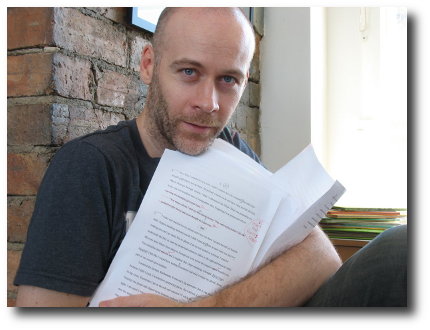 Look
at me! I’m clinging to life here. I’ve been so sick I couldn’t even reach the razor. That was for the first few days. Then I started to like it. I have about twelve hours of this Man Grizzly look left before Jen realizes it’s voluntary.
Look
at me! I’m clinging to life here. I’ve been so sick I couldn’t even reach the razor. That was for the first few days. Then I started to like it. I have about twelve hours of this Man Grizzly look left before Jen realizes it’s voluntary.
Copyedits off to Vintage today. I pity the fool who has to typeset this mess. I went nuts. And I don’t even know what most copyediting symbols mean. I had to guess.
It’s 2011 and publishers still print out manuscripts, manually scribble on them, and type the whole thing in again.

















































 7 comments
7 comments




